Worldlog 21 dicembre 2015
All’inizio di dicembre ero io la rappresentante della commissione della Camera alla riunione sul clima a Parigi. Dopo un buon viaggio venivamo accolti nell’ufficio della delegazione olandese. Subito il primo giorno siamo andati da alcuni sportelli dove vari paesi facevano vedere come combattono il cambiamento climatico. C’erano anche molte sessioni e relazioni su argomenti come la deforestrazione, agricoltura sostenibile, tassazione del CO2 e finanziamento del clima.
E’ stato bello vedere che l’attenzione delle sessioni era su misure concrete per il clima. Questo era evidente anche dagli sportelli degli NGO chiamati Climate Generations Areas (Zone di Generazioni Climatiche). Sulla strada, molti partecipanti del congresso hanno notato degli alberi che raccolgono il vento, trasformandolo in energia.
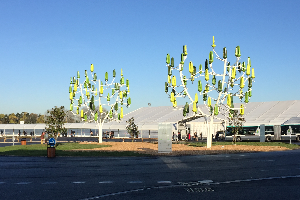
Alla vigilia della riunione climatica, ho chiesto al premier Rutte durante il dibattito sul clima nella Camera, di portare l’attenzione anche sull’emissione dei gas di serra causati dal settore del bestiame. Il modo piu’ veloce per raggiungere risultato sul clima, e’ legato a mangiare meno prodotti in base all’animale e raggiungere un’agricoltura piu’ sostenibile. Il nuovo accordo climatico non contiene nessuna parte legata alla diminuizione dei gas di serra. Come forse gia’ sapete, il settore del bestiame e’ numero uno in termini di emissione dei gas di serra nel mondo.
A Parigi ci siamo informati su come funzionano gli accordi internazionali sulla diminuizione dell’emissione dei gas di serra e su come adeguarsi ai cambiamenti climatici. Abbiamo anche parlato con uomini di affari innovativi, che sono convinti che dobbiamo cambiare il modo in cui facciamo affari, come ad esempio Fijke Sijbesma, presidente di DSM e Peter Bakker del World Council for Sustainable Development (Associazione mondiale per lo sviluppo sostenibile). Potremo utilizzare queste informazioni durante i dibattiti che seguiranno la riunone climatica nella Camera. Poiche’ ora che l’accordo climatico e’ stato accettato, bisogna ovviamente andare avanti con l’eseguzione!
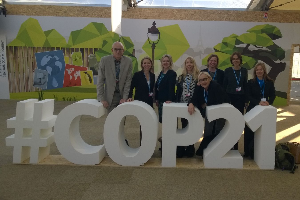
La delegazione della nostra Camera alla riunione climatica a Parigi
Questo mese ha avuto luogo anche il dibattito principale nella Camera per quanto riguarda l’agricoltura e la natura: il dibattito sul finanziamento. Ho chiesto al governo non solo l’attenzione per la bio-industria, gli animali per la sperimentazione e la caccia, ma anche di continuare ad investire nella natura dell’Olanda Caraiba. Vi sono 275 specie di animali e piante in questa zona. L’investimento nella natura viene spesso visto come un passatempo di lusso. Ma indagini dimostrano che ogni euro investito dal governo rende almeno il suo valore in ritorno. Soprattutto nelle isole Caraibe, dove esiste un modello unico e sostenibile di generare soldi, che e’ un esempio per molti altri paesi.
Abbiamo anche richiesto piu’ fondi per la ricerca sulle alternative per le sperimentazioni sugli animali. Vengono investiti centinaie di milioni nelle sperimentazioni sugli animali, ma le grosse scoperte mancano. Sempre piu’ scienziati ammettono che le sperimentazioni sugli animali bloccano spesso l’innovazione medica. Durante il dibattito abbiamo chiesto anche piu’ fondi per l’Autorita’ Olandese Alimentare per supervisare il benessere degli animali.
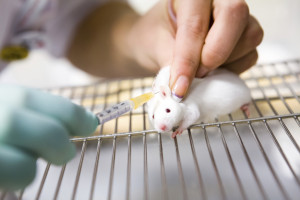
Successivamente al dibattito abbiamo avuto alcuni successi: grazie alla nostra mozione, finira’ il metodo crudele di uccidere i maiali tramite CO2 nelle macellazioni. Il governo dovra’ anche fermare le provincie di uccidere tantissime oche e trovare un metodo piu’ gentile per gli animali per non danneggiare i campi con il cosidetto Agrilaser.
Questa settimana ho anche collaborato per un programma televisivo di CCTV America sull’influenza dell’industria del bestiame sull’ambiente, insieme a Kip Andersen. E’ il regista di Cowspiry, un documentario sull’impatto disastroso della produzione del latte sul clima. Potete trovare qui l’intervista.
Bettina Jung e Martin Buschmann – rappresentanti del nostro partito tedesco: Partei Mensch Umwelt Tierschutz (Partito Uomo Ambiente Tutela degli Animali) – hanno dato insieme a circa 30 membri una petizione con 32.000 firme contro le sperimetazioni sugli animali al comune di Amburgo. Ottima iniziativa!
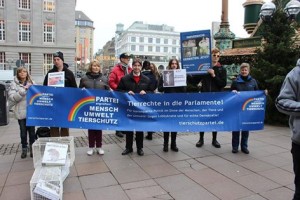
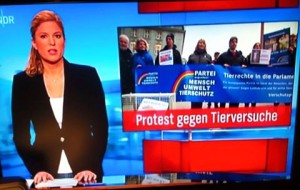
Cordiali saluti,
Marianne
At the beginning of December, I was head of delegation of our Lower House committee joining the 2015 Climate Change Conference in Paris. After a successful train journey we received a warm welcome by the Dutch delegation office. Directly on our first day, we visited several pavilions where countries demonstrated how they were tackling climate change. In addition, there were many workshops and lectures on topics such as deforestation, sustainable agriculture, carbon pricing and climate funding.
It has been rewarding to see that the focus during these side events was on concrete climate action. A stroll past the numerous NGO stands in the so-called Climate Generation Areas confirmed this. On our way there, trees catching wind and thereby able to produce energy, attracted a lot of attention from the conference participants.

On the eve of the climate conference, I urged Prime Minister Rutte during our climate debate in Parliament to also give consideration to the greenhouse gas emissions caused by livestock farming during the climate debate and the climate conference. By far the most climate benefits can be achieved by eating less animal products and by advocating sustainable agriculture. The new climate deal does not mention agreements on reducing greenhouse gases in agriculture, and as you may already know, livestock farming is the number one cause of greenhouse gas emissions in the world.
In Paris, we have obtained information on how agreements are reached at an international level about reducing greenhouse gases and adapting to climate change. We have also held discussions with business pioneers including CEO Fijke Sijbesma of DSM (Dutch Sciences Company) and Mr Peter Bakker of the World Council for Sustainable Development, who strongly believe that business as usual is no longer an option. We will be able to use this information during the Dutch Lower House debates following the climate conference. After all, now the climate deal has been accepted, it is time to take action!
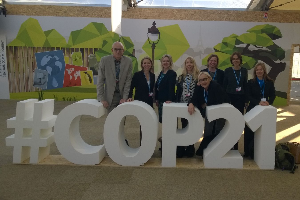
Our Lower House delegation at the climate conference in Paris
December has also been the month of the most important Lower House debate on agriculture and nature: the budgetary debate. As well as attention for factory farming, animal testing and hunting, I have asked the government to keep investing in Dutch Caribbean wildlife. These islands are the habitat of no less than 275 animal and plant species. Investing in plants and wildlife is often considered to be an expensive hobby. However, research has shown that each penny spent by the government on wildlife more than pays for itself. This is certainly the case with the Caribbean islands, where a unique and above all sustainable income model has been created, which serves as a model for many other countries.
We have also called for more funding for alternatives to animal testing. Although hundreds of millions of euros are invested in animal testing, there still have not been any major health breakthroughs. More and more scientists have admitted that in many cases, animal testing is in fact slowing down medical advances. During the debate, we have also called for an additional budget for the Netherlands Food and Consumer Product Safety Authority to be used for monitoring animal welfare.

The debate has led to some successful results: for a start, our motion will put an end to the cruel carbon dioxide stunning of pigs in slaughterhouses. In addition, our government must stimulate the provinces to stop the massive killing of geese and commit themselves to a more effective and animal friendly way of damage control on the fields by means of the so-called Agrilaser.
This week I have also worked with Kip Andersen on an episode of CCTV America about the impact of livestock on the environment. Andersen is the director of Cowspiracy, a documentary on the devastating impact of dairy farming on climate change. You can watch the interview here.
Bettina Jung and Martin Buschmann – representatives of our German sister party Partei Mensch Umwelt Tierschutz – together with about 30 other members have handed over a 32,000-signature petition against animal testing in Hamburg at the City Hall of Hamburg. A great step!


Kind regards,
Marianne